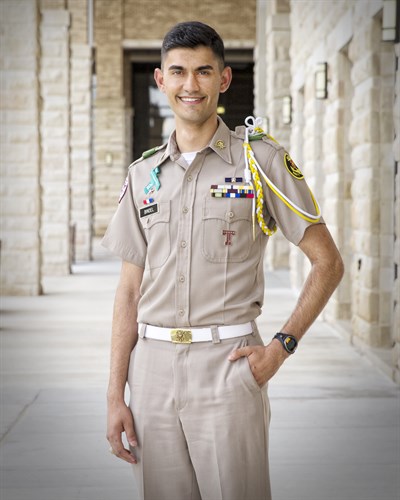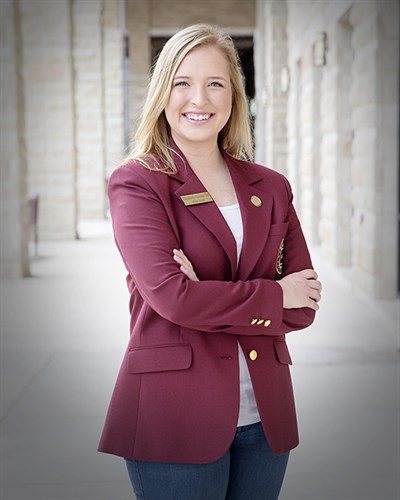BIMS Majors Give Back Through Service, Research
It is evident from their level of involvement on the Texas A&M campus that junior biomedical sciences (BIMS) majors Ryan Bindel and Elizabeth Nevins have “servant hearts.”
 Bindel is a member of the Texas A&M Corps of Cadets who will join the U.S. Navy after he graduates; he plans to become a physician in the military. An avid runner on marathon and triathlon teams, he’s active in the Ross Volunteer Company and tutors his fellow cadets. Nevins, who plans to become a pediatric hematologist or oncologist, is involved in Fish Camp, her sorority Delta Gamma, and Big Event.
Bindel is a member of the Texas A&M Corps of Cadets who will join the U.S. Navy after he graduates; he plans to become a physician in the military. An avid runner on marathon and triathlon teams, he’s active in the Ross Volunteer Company and tutors his fellow cadets. Nevins, who plans to become a pediatric hematologist or oncologist, is involved in Fish Camp, her sorority Delta Gamma, and Big Event.
Both are active undergraduate research assistants in the College of Veterinary Medicine & Biomedical Sciences (CVM). Both also are scholarship recipients-Bindel, through the military, and Nevins, through the Terry Foundation.
“I actually had two scholarships that allowed me to come to A&M,” Nevins said. “If I didn’t have these scholarships, I probably wouldn’t be here.”
Because of the significant role that benefactors have played in their collegiate careers, Bindel and Nevins decided to give back by applying to the Texas A&M Foundation’s Maroon Coats ambassador program, which aims to increase the culture of philanthropy at Texas A&M by educating students on the importance of outside support and thanking donors.
More than 300 students applied for the prestigious position, and the selection process was rigorous, including multiple rounds of interviews, according to the students. Only 20 were selected for the 10th class this year, and both Nevins and Bindel were among them.
“I’m humbled and excited for the opportunity; I am really glad to bring the College of Veterinary Medicine & Biomedical Sciences to Maroon Coats and the foundation because I want to support this college in any way that I can,” Bindel said. “I know in previous years, there have not been many Maroon Coats from this college, and so I really was looking forward to the opportunity to say, ‘Hey, we’re doing incredible things, and we can grow in these ways. Please help us get there.’ It’s really just exciting.”
Bindel, from Mansfield, Texas, never intended to choose Texas A&M he was accepted into the United States Naval Academy and planned to move to Annapolis, Maryland. And then his father was diagnosed with colon cancer.
“We recognized late into my senior year that he was getting much worse, and he ended up passing away in June,” Bindel said. “So we made the decision that going away to the Naval Academy just wasn’t a very good option for my family, for my two younger brothers and my mom, and I needed to stay in Texas; and that was something that was totally OK with me.”
To Bindel, the next best military school was Texas A&M, so he applied and was accepted.
“Initially, I did not enjoy it at all,” he said of his freshman year.
But one day, bussing to West Campus, he took the only empty seat and noticed a copy of The Battalion lying there. In that edition was a story featuring the work of Dr. Nancy Turner, a research professor in the Department of Veterinary Pathobiology; that ultimately led to his involvement in undergraduate research.
“Dr. Turner does colon cancer research, and my dad passed away of colon cancer, so that was just a really easy decision for me to get involved,” Bindel said. “I said, ‘Yeah. I want to contribute to this field and learn more about the disease.’ I don’t know how I would’ve gotten involved in Dr. Turner’s lab if I hadn’t read The Battalion that day.”
Through Turner’s laboratory, Bindel works on a NASA-funded project studying colon cancer and how the cancer manifests in the “astronaut environment.” His work is part of the undergraduate research scholars’ program, and he wrote his thesis on the project.
“The experimental design that we use includes a no gravity, high-iron diet, which astronauts receive, and then the radiation,” Bindel said. “All three of those combine to cause injury to the colon, which has the potential to cause cancer.”
The indirect connection to his father through his research and the new family he found through the Corps of Cadets have changed Bindel’s initial views of Texas A&M.
“Over time, I realized how important each of the traditions is and the family-like environment of being an Aggie,” he said. “Understanding what that means and getting all wrapped up in it, I realized this is exactly where I need to be.”
It was also his connections in the Corps that led him to the Maroon Coats program.
“My commanding officer last year, Marisa Howat, was a Maroon Coat, and I got a little bit of a closer interaction with her and seeing what she did,” Bindel said. “She got to wear the coat to a football game and sit in the President’s Suite, and I was like, ‘That’s kind of cool. How do I do that?’ That sparked the initial conversation.”
Now, though only an active Maroon Coat for a few months, Bindel has found that the program has deepened his connection to the university, its donors, and the entire community.
“An Aggie’s always an Aggie, and I think it’s more than just the students; it’s the community, as well,” he said. “The Bryan-College Station area and the former students who just care so much about what is happening at the school, and, more importantly, the people who are in it, all of the Aggies are incredible. That family aspect has really hooked me.”
Unlike Bindel, the Aggie traditions and people were a big part of Nevins’ attraction to Texas A&M. Like with Bindel, the research component became a major draw to the BIMS program.
 A Plano, Texas, native, Nevins said she always knew she wanted to be a doctor, so selecting the BIMS program was the obvious choice.
A Plano, Texas, native, Nevins said she always knew she wanted to be a doctor, so selecting the BIMS program was the obvious choice.
“I grew up the youngest of three, and so I’ve always been taken care of. But I’ve always wanted to be able to take care of other people, and science has always intrigued me,” she said. “I’ve always wanted to work with children, as well, because I was a swim teacher growing up. I just love how resilient they are and how they have such a positive outlook on life.
“Biomedical sciences is very tailored toward research and becoming more of a well-rounded student. I especially like the electives I’m taking, and it’s so interesting to actually be involved not just in the sciences, but in the application of the sciences,” she said. “I think that’s what’s so special about BIMS; it helps you see real-world problems and how you can solve those problems innovatively, using the sciences, and then apply that to real-world problems today.”
Knowing that she could make a long-term impact on the lives of others through research and the role research will play in her future career, Nevins got involved in the lab of Dr. Kevin Cummings, assistant professor in the Department of Veterinary Integrative Biosciences, studying the transmission of Salmonella by examining fecal samples from animals in feed lots.
“We’re looking at birds mainly around H-E-B and Kroger, and you can see the transmission from animal to humans and how that relates,” she said. “The reason I was drawn to this research is because there’s a bridge between animal and human transmission with diseases, and I feel like sometimes it gets overlooked when you’re going into human medicine.”
Her lab work is facilitated by the fact that she doesn’t have to worry about tuition as a Terry Scholar, which provides her a full-ride scholarship, ultimately easing the burden on her family of the expense of medical school.
Through the Terry Scholars program, Nevins learned about the Maroon Coats, and the idea of giving back through service to prospective students and donors appealed to Nevins greatly. Over the past decade, the group has devoted more than 7,300 service hours in the community, provided more than 200 campus tours to prospective students and other guests, and written thousands of thank-you letters and made hundreds of phone calls to donors and friends.
“Unfortunately, I’ll never get to meet my Terry Scholarship donors because they passed away years ago, but I know there are so many donors here who go unnoticed and unrecognized,” she said. “It’s funny; my freshman year, Maroon Coats opened the door (at the A&M Foundation) for me, and I remembered that during my Terry interview, they asked me how I would give back in the future.
“Through Maroon Coats, I’m able to give back a little bit of my time,” Nevins said. “In the future, I want to give back monetarily like these donors have, but for right now, giving my time and my Aggie spirit and wanting to make something of myself is, I feel, giving thanks to them.”


